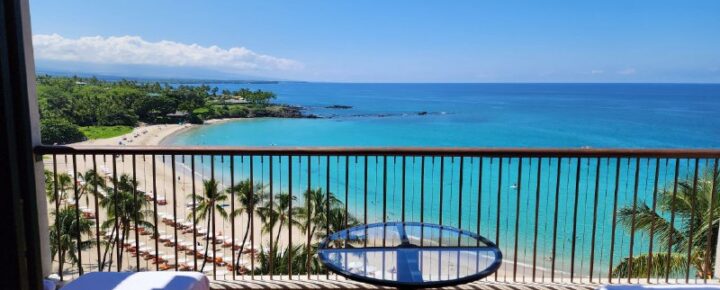In parallel with huge legislative reforms, and legal questions arising, both statewide and on Maui, the vacation rental market in Hawaii is already experiencing a marked downturn in occupancy rates. Mixed messaging from the state did not help matters either. That contrasts starkly with the far more robust performance of Hawaii hotels.
A recent report from the State of Hawaii for March (below) highlights this trend, with vacation rental occupancy notably lower than that of hotels, signaling shifting preferences, increased concerns, and potential repercussions for Hawaii tourism and the economy. Mixed messaging from the state
This downturn comes in the same week as recent legislative actions, including Governor Josh Green signing the bill that empowers counties to regulate or even outright eliminate vacation rentals. Maui has already taken aggressive steps by planning to phase out approximately 7,000 rentals, as detailed in our previous coverage. These developments reflect a broader strategy to repurpose short-term Hawaii vacation rentals to alleviate the state’s acute housing shortage.
Update: The decades-long growth of Hawaii vacation rentals, now rapidly changing, has led to what critics and some commenters here describe as economic exploitation. Speculators have purchased properties for vacation rentals, allegedly squeezing out residents. This is said to have led to increased housing costs and a decrease in available housing for residents. All of this has added significantly more pressure on vacation rentals, even before the legal battles get going.
With this in mind, Governor Green has also now emphasized the need for careful legislative crafting by Hawaii’s counties in order for them to avoid the potential lawsuits and issues of unconstitutionality that are lurking. In doing so, he reaffirmed the complex legal landscape surrounding vacation rental regulation here in Hawaii.
The decline in visitor interest and occupancy is significant for Hawaii vacation rentals.
For a myriad of reasons, statewide, the vacation rental occupancy rate plummeted to just 60% for all of 2023, a sharp decline of 25% compared to 2019. This decline in demand coincides with a 14.5% reduction in short-term rental supply since the pre-pandemic era, reflecting a contracting market.
At the same time, the price of Hawaii vacation rentals surged by 45% in 2023 compared to pre-Covid, with the average daily rate reaching $301 before 18% taxes and multiple fees.
For March 2024, the state DBEDT reported a significant downturn in occupancy rates, reflecting a growing disfavor among visitors for short-term rentals compared to traditional Hawaii hotels. The data for this period shows a pronounced gap between the occupancy levels of vacation rentals and hotels.
Despite a slight rise in supply, demand in March only saw a slight increase of 4.3% over the previous year while remaining 25.9% below March 2019 levels. The statewide vacation rental occupancy rate for March was 57.4%. This occupancy rate marks a decrease of 5.3 percentage points from 2023 and an even more significant drop of 21.2 percentage points compared to 2019. The Average Daily Rate (ADR) for vacation rentals increased to $337, up 3.5% from 2023 and a whopping 57.8% from 2019, indicating widespread higher pricing despite lower occupancy rates.
This occupancy data of 57.4% in March contrasted sharply with Hawaii’s hotel sector, where the occupancy rate was at 74.6% for the same March 2024 period.
The decline in vacation rental performance likely doesn’t reflect even the notion of the regulatory changes that are just starting. Visitor sentiment, however, has already shifted, in part due to increased pricing, inconsistent quality, and other concerns, including questioning the legality of short-term rentals. This aligns with historical data indicating a long-term decline in visitor interest in Hawaii vacation rentals, including on Maui and Kauai.
The legislative imperative to curtail vacation rentals, in itself, reflects a significant policy shift. The state has now granted the counties the explicit authority to phase out Hawaii vacation rentals, which brings the potential for reshaping the visitor accommodation landscape across the islands. The move is supported by entities such as the Hawaii Lodging and Tourism Association (HLTA), which sees it as a means to reduce competition for hotels and potentially stabilize or even increase hotel occupancy and pricing.
Hawaii grapples with these changes, and the economic implications are profound.
The vacation rental sector, once a boon to Hawaii’s tourism economy, faces a precarious and uncertain future. Property owners, local businesses, and service providers who have long depended on the thriving vacation rental market may find themselves navigating new economic realities.
The full impact of these recent changes on Hawaii tourism, local housing, and overall economy remains to be seen. As stakeholders continue to debate this topic and help shape the future of Hawaii vacation rentals, the outcome will have profound and long-lasting implications for Hawaii visitors and residents.
hawaii-vacation-rental-performance-2024-03Get Breaking Hawaii Travel News







Typically on an annual basis, Snow Birds from Canada fill up the Jan/Feb months. Due to the poor exchange rate, those visitors were missing in 2023 and 2024. Mainland renters have to take up some of the slack but this reduces overall occupancy as it’s the mix of travelers from multiple countries that drives high occupancy. Guests don’t comment that Hawaii politics/policies are affecting their decision making process. This is a good thing as it’s a mess as you have mentioned.
I own my condo outright. I have paid the state over $60,000 in GET & TAT. Now times that by how many TVRs are there? Well guess what, I wont rent it out any longer, I won’t sell it either and now the state wont get one more dime of TAT & Get. Hoping all other TVRs do the same. Now who wins! This entire tourist issue was created by your own politicians over the years and this bill was funded by the hotel industry anyway. To think this will make affordable housing is laughable but not a surprise coming from the level of intelligence of commerce from those in office. Good luck in court Green and explaining to those that work in the service industry tied to tourism that no longer have jobs.
We have come to Kauai every single year for decades. Usually for a month or sometimes six weeks. We work hard and save and save to be able to come back. We are terribly sad we are not able to continue. The costs have become extremely heavy to the point of being ridiculous.
We figured out we could take 3 vacations elsewhere that is tropical and beautiful for the same cost as one visit to Kauai.
Kauai is in our hearts and souls. We love the people, we respect the island and wildlife.
We are sad beyond belief.
BOH guys:
I found an interesting article in the Harvard Business review:
hbr.org/2024/02/what-does-banning-short-term-rentals-really-accomplish
Please post if you think appropriate.
Thanks
Thank you for the article. It’s good to see an objective, data based evaluation of the short term rental market.
“Given the large widespread benefits and the limited concentrated costs of short-term rentals, how should cities regulate short-term rentals? By striking a balance, so that travelers and hosts gain without short-term rentals overwhelming entire neighborhoods or significantly reducing the housing units allocated to long-term renters. This can be accomplished with limits — rather than outright bans — on when and where housing units can be rented out to travelers.” That’s a more nuanced and effective position.
I’m confused, if Hawaii’s population is declining, how can there possibly be an acute housing shortage…..doesn’t make any sense!
In 2019 our family of four vacationed for three weeks in Hawaii and spent on average $200-300 per day supporting local businesses over our three week trip. The cost of the same trip in 2024 was 3x as expensive and thus we only stayed for one week, paired down the activities and spent slightly the same amount per day. The sooner the state realizes that tourists wages have not got increased just the same as their local native wages relative to inflationary trends and get back to supporting mom and pop local tourist businesses through better policy the better. Trying to wrap this into big chain hotels by eliminating airbnb and short term rentals will not help. We too will find other places to explore, though Maui will forever be in our heart
As a visitor to Hawaii 9 out of the last 10 year’s for six weeks each winter, I am horrified at the rental prices being asked by rental properties. The property we usually stay at in Kihei has doubled in the last 3 years. If you don’t want tourists just say so. No wonder rental occupancy rates are falling. I’m not sure how this benefits the average person working and trying to make a living in Hawaii. I guess hotel corporations might be happy. Going to St. Martin next winter for less than half the price of Maui and I’m probably not the only one.
They’ve been saying it for years they don’t want the tourists, just the $$$. We loved Hawaii, visited many times. Not anymore. We just did 2 days in Florida & a 7 day Caribbean cruise for less than it would have cost to go to Hawaii. We are already planning the next trip…back to the Caribbean.
On Maui there is so much tension. You can feel it in the air from locals.
Some real rude store clerks towards who they think are tourists. Who they think are locals get treated kindly. There is still some great kind people though.
Maui is pretty quiet in regards to beach and restaurant crowding.
Maui is in a balance shift.
For every Ying there is a Yang.
The Yang isnt always as good as the Ying promised.
I hope all can find a happy medium.
No one owns Hawaii. All humans are stewards of the Earth and what it beholds.
Unfortunately Hawaii, in general, has gotten greedy with taxes, resort fees, resort parking, hating the tourists, and now trying to get rid of STR’s, which are the only less expensive alternative to the greedy hotels, is just too much. To pay overpriced amounts for a room, just to sleep in, and car for a week can be better spent elsewhere. My large amount of Hawaiian miles I’ve accumulated are not going be used for a stay in Hawaii, I’m just going to pass through on the way to Japan. Once used up, I’m cutting up the Hawaiian Airlines card which I have enjoyed since 2005 and Hawaii since 1973. When tourism drops even lower and stores that survived the Covid BS start closing, maybe something will change.
I’d much rather pay the lion’s share of my vacation budget to local dive shops than to some hotel chain. How many visitors will go elsewhere, and end up spending $0 on Maui?
My wife and I for one.
I have been monitoring listed real estate in certain categories like STRs and that’s sinking as well. Even locals in their every day homes that are not in the STR are likely to see their real estate value diminish.
Yea! So glad VRs suffering. They fed off local aloha, gave back grief. Self-profit on the backs of locals. Less tourist oriented residences, more residences for residents.
Fascinating comment. Surely you have some data to back it up?
I manage a large portfolio of vacation rentals.
For condos, if the owner does not have a mortgage, maintenance fees are the single largest expense, averaging $1.00/s.f./month.
Let’s use an Ilikai 1 bedroomas an example:
Maintenance fee is approx $575/month.
Property tax is ~$400/month
Airbrb, vrbo & booking.com charge 14% or more for their role.
GET, TAT & OTAT = ~18% on each booking.
Cleaners charge $150 or more for each cleaning.
Property management companies typically get 20% of each booking.
Credit card companies charge 3% or more on every dollar charged.
Lots of money moving, but the owners of the units often are barely making enough to cover their costs.
Kev
In reading your post, I see 2 big job markets gone once STRs are gone.
Housekeeper cleaners and maintence jobs.
That does not seem good
So you’re getting 20% of each booking? Would you accept 10% and leave a little for the condo owners and vacationers? And how about cleaning the units for your cut, so we don’t have to hire separate cleaners? C’mon man.
Ok. No doubt local residents have all the money to afford all that expensive STR real estate…and the lenders are ready to offer those with jumbo loans (for the ones that will still be employed)…. I’m being sarcastic.
So if there are no more speculators in the market to buy your sinking real estate, who are you going to sell to?
Exhibit A:
This is happening globally –
In Palm Springs, a cap on short-term rentals in specific high-demand neighborhoods has all but frozen the market in those communities.
Sales are down. Homes languish on the market for months. And investors who bought up Palm Springs properties during the COVID-19 pandemic are facing hundreds of thousands of dollars in losses.
I can see that you believe this without considering the jobs and revenue brought by the visitors they housed. This will not magically provide housing that is low income. It will drive our already high costs up further. Businesses will shut down because the numbers won’t make sense. Many STRs won’t be adequate long term. This is not thought out. It will affect You negatively as well as all of us.
No STR owner in his right mind is going to open up his investment to low income housing. This new policy of banning STR is a knee jerk reaction to a problem that has been decades in the making. Kauai tried it with poor results. This attitude of “the world owes me a living” is going to backfire and drive out both business and tourism. We are Canadians who have visited Maui every year for 30 years. No more- you’re just too expensive and we can’t take the “us vs them” attitude any more. You got what you wanted!
How will these residences get paid for if there are no tourists? Please explain how that works.
Due to the decades long greed of vacation rental owners and the hotel chains, we will never travel to Hawaii ever again. We have advised all of our friends and family to avoid Hawaii. Florida for the win!
We worked day in and day out, often more than 100 hours a week for decades to have a small place in Maui that we could go to. And yet we still have to rent it out to afford to have it. These people making nasty comments about those of us who have worked hard all of our lives in order to have a little bit of Aloha in our lives are themselves the greedy ones. They want what we have worked so hard for, without having to work for it at all. I can tell you that we will not be selling our place even if we have to trim our budget in order to hold on to it. The selfishness in greed of people who have no idea what was sacrificed for us to have a place in Hawaii is unbelievable.
You made a speculative investment. There are no guarantees of a return. If you can’t pay the mortgage and all other expenses on your own you should not have made the purchase in the first place.
Do you realize that most STRs have never been through a real jobs recession?
All investments are speculative Bill. You sound jealous
Greed is not STR based. They have heavier costs. The hotels and politicians backing them that stir the greed pot. Our cost of living and running businesses, commercial rent and taxes are so high which raises the rates landlords charge. Vrbo and Airbnb fees have gone up. Book direct. No place like HI! Not all of us have lost aloha!
Whether you’re a tourist looking for a vacation rental, or a property owner/investor interested in vacation rentals. North Carolina welcomes you. North Carolina has passed a series of laws, guaranteeing that property owners have the Right To Rent. Once again, if you’re a tourist looking for a vacation rental, Hawaii has made it clear…they don’t want your business. North Carolina does…
There are bans all over NC. Google it and it is endless:
Citizen Times – ASHEVILLE – A 2018 city ban on new short-term rentals left untouched the booming vacation rental industry outside city limits ― but that may change as county government now eyes restrictions…
“Our demand so outstrips our meager supply of housing,” county Planning Director Nathan Pennington told the Citizen Times Jan. 5.
‘Greener’ Pastures have arrived! The question of the day, week, year, shall be: but for whom? Certainly Not for the STR Owners nor those who will be enforcing the demise. The Attorneys are sharpening their talons, awaiting the first of many tasty tidbits and lawsuits. Green is assuming that nothing can touch him, but can’t it! Legislating Illegal Procedures is interesting, it’s a trail of Evidence leading back to Green. Can we get this fortunate?
Having just returned from a 2 week stay on Maui, I would have to say the cost of our vacation was twice what we normally paid in the past. Our love for the island has been ruined by greed. Everything has gotten So Expensive that we purchased less cloths and gifts than we normally would. Also we went on far less excursions than normal due to the high cost. Additionally we were shocked that the aquarium raised their rates do to inclement weather causing more visitors??? Our next island trip will not be to Hawaii, the cost of this trip has us convinced that our money is better spent on All Inclusive vacations to other island destinations. It is heart breaking that the islands we love have priced themselves out of the vacation market.
If you think it’s expensive now, just wait till the hotels plan to eliminate short-term rentals is successful. They can’t wait until they have no competition, and can raise our prices to whatever they want